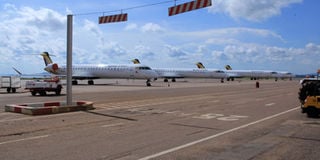Coronavirus to slash aviation revenue by $252 billion

Uganda Airlines aircraft parked at Entebbe International Airport. Global airlines fixed costs may hit $61 billion in the second quarter. Photo by Rachel Mabala
As several countries retreat into lockdowns to limit the spread of Covid-19, the International Air Transport Association (IATA) says the airline industry will suffer from the effects of lockdowns.
It is estimated that globally, airlines are liable for $35 billion in refund for tickets sold but unflown.
Speaking during teleconference in Geneva on March 30, the director general of IATA, Mr Alexandre de Juniac said: “The situation of the airline industry remains grave. We have been working from a scenario of severe travel restrictions lasting for three months. That will cut industry revenues by $252 billion in 2020 compared to 2019,” he said.
Mr Alexandre stressed that Britain has worked through the impact of that scenario on the bottom line. That is a $39 billion net loss in the second quarter.
“We also see the industry burning through $61 billion in cash in the second quarter—a precipitous fall for cash balances. As we have said before in these calls, the dimension of this crisis is beyond anything that the industry has experienced: When borders are closed and people’s mobility is limited by governments, our business disappears,” he said.
Adding: “If we cannot move people that impact is felt across the economy. When 70 per cent your business vanishes overnight, there is no amount of cost cutting that can adequately fill the gap.”
The US and European countries government are providing some stimulus to save the airline company from collapsing as a result of COVID-19.
In this regard he said: “It is good news when governments come to the table with relief measures. The biggest one since our last call was the $2 trillion package in the US that included over $50 billion for airlines and their employees. Colombia, Singapore, Australia, China, Norway and New Zealand are also among governments that have taken specific relief measures.”
The massive restrictions that governments have imposed on movement mean that massive numbers of flights have been cancelled, creating a huge refund liability. Britain has calculated that globally, airlines have a $35 billion liability for tickets sold but which are unflown.
The Canada, Colombia and the Netherlands have allowed airlines to issue vouchers in place of refunds. This will enable airlines to preserve the cash they need to keep cargo operations running and preserve their ability to be fully operational when we can safely re-start the industry.
Expressing his appreciation with governments that have responded, Mr Alexandre said these governments have taken an extraordinary measure in extraordinary circumstances.
“I cannot stress how important that is. When the public health crisis abates to the level where it is safe to re-start the economy, the airlines must be ready to go. The recovery will be slower and much more painful if airlines are not able to support trade and tourism,” he said.
Cargo
However, the cargo sector is still operating but struggling to meet demand. Passenger operations have been reduced so drastically that there is just not the capacity in the system to meet the reduced levels of air cargo. This includes vital medical shipments on which people’s lives depend.
He explained that Airlines are being creative in mounting cargo operations as charters and using passenger aircraft.
“On top of the “normal” process of obtaining traffic rights and landing permissions, in the current situation we were also seeing cargo crew being delayed by quarantine restrictions designed for commercial passengers.”
Mr Alexandra said last week, the European Commission published guidance to help clear the roadblocks in Europe.
In the wake COVID-19, some governments have already responded to the airlines crisis to enable them operate when the pandemic is over or contained.




